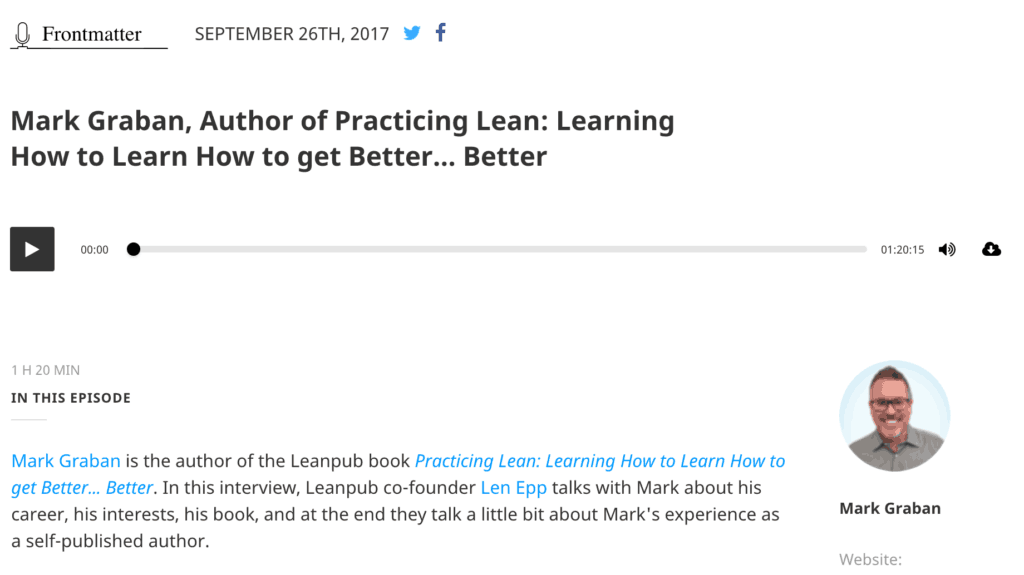I really appreciate what the team at LeanPub.com does, with their approach to “Lean Publishing.” I've published a few compilations of blog posts and podcast interviews there and the site was also the first place I published our book Practicing Lean. I'm also selling an audiobook version through their site.
Back in 2012, I did a two-part podcast (here and here) with the LeanPub.com co-founders. Now, they've turned the tables and invited me to be a guest on their podcast where they talk with LeanPub.com authors.
You can listen to the podcast or read a transcript on their site. You can also read the transcript on Medium.com. You can also subscribe to their podcast via iTunes.
Here are a few excerpts and quotes…
On Toyota
Today in 2017, Toyota people who go and help people – suppliers, non-profits – there are great success stories out there with food banks and eye clinics. Toyota describes lean as not just a set of technical methods of how do we improve – tools if you will – but they also describe it as a management approach. You could describe it as a style of leadership. They also describe it as a philosophy. And Toyota – I think, most importantly – describes it as an integrated system. All of this together – developing people, improving the results of the organization.
A few related posts on those points:
Lean: The Toyota Production System is Mainly About the Philosophy
Video: Toyota Helps a NYC Food Bank & Hurricane Sandy Victims
On Systems
I think Wells Fargo is a situation with a systemic problem. More recently, the United Airlines case – with the doctor being hauled off the flight – I'll give the CEO credit; he says, “Look, this was a system failure, and that's on me as the CEO.” And they're changing policies, they're trying to change some rules and set people up for success.
Don't put gate agents in that incredibly awkward, awful situation where you've got to figure out a way of freeing up four seats for employees to take those seats. And you're not really given much of an arsenal. You can offer up to $1,000, and then I guess the only thing was – well, you call the police. And that escalated quickly, and to their credit, they are changing the rules so that really should not happen again.
Related posts:
Lessons from the Wells Fargo Scandal, Mismanagement, and Gaming the Numbers
The United Flight 3411 Mess, Holding Individuals Accountable vs. Fixing the System [Updates]
The Good and the Bad of the United CEO's Follow Up to Flight 3411
On Practicing Lean
So part of what led to the book, Practicing Lean was reflection around, it's easy to go off on a rant about the 5S cop. But then I sort of stopped to think, “What good does it do to mock that practice?” You'd say it's a cautionary tale. I've had somebody email me and say, “Look, our company's started to go down this dysfunctional lean office 5S cop path. And because of your blog post, it helped convince people that we should call time out, and really re-evaluate – are we solving problems, or are we implementing 5S?”
But in the practice of lean, we all make mistakes, and that's what this book is about. Myself included. Sharing some of these stories, where you might say a little bit of knowledge can be a dangerous thing. I've learnt a method, I've learned a tool. I'm going to go apply that tool. People may make mistakes that are born out of over-enthusiasm. And I think part of the key thing is, if we make a mistake, do we listen for feedback?
Related posts:
And more posts on the theme of the book.
On a “Free” Minimum Price
Len: Also, I guess I just should mention that we have books that have made a lot of money, that have a free minimum price.
Mark: Interesting.
Len: Our bestselling book has a free minimum price. And bestselling by revenue, I mean. It's both bestselling by copies and by revenue, and it has a free minimum price.
People really do pay. It's something that for us, we're just – in-house we just know this so straightforwardly, we need to sometimes de-familiarize ourselves, and understand that to most people, the idea that there's value to the author in giving something away for free, and that people will pay for free things- those are quite unfamiliar concepts, surprising concepts to people.
…
Len: That's a fascinating dynamic, which I could talk about for a long time. But the idea of giving – it's sort of related to what we were talking about earlier – about empowering employees, is that when you give people choice, sometimes their choices surprise you.
And it's because you've given them choice that – it's not the specific choice you've given them, it's that you've given them choice in the first place – that changes what's going on. I could talk about this for a long time…
Based on our conversation, I set the minimum price to free… and that has led to MORE paid sales and MORE revenue, which is indeed a fascinating dynamic.
As you might know, if you choose to pay for the book or audio book through LeanPub.com, 100% of the proceeds are being donated to the Louise H. Batz Patient Safety Foundation. We're also donating proceeds from Amazon sales too.
More about making “Free” an option:
A Ten-Minute Talk on “Practicing Lean” [Transcript] – And an Update on the Book
I hope you'll check out the whole interview. It's long, but Len asked a lot of great questions and I hope you enjoy it.
What do you think? Please scroll down (or click) to post a comment. Or please share the post with your thoughts on LinkedIn – and follow me or connect with me there.
Did you like this post? Make sure you don't miss a post or podcast — Subscribe to get notified about posts via email daily or weekly.
Check out my latest book, The Mistakes That Make Us: Cultivating a Culture of Learning and Innovation:











